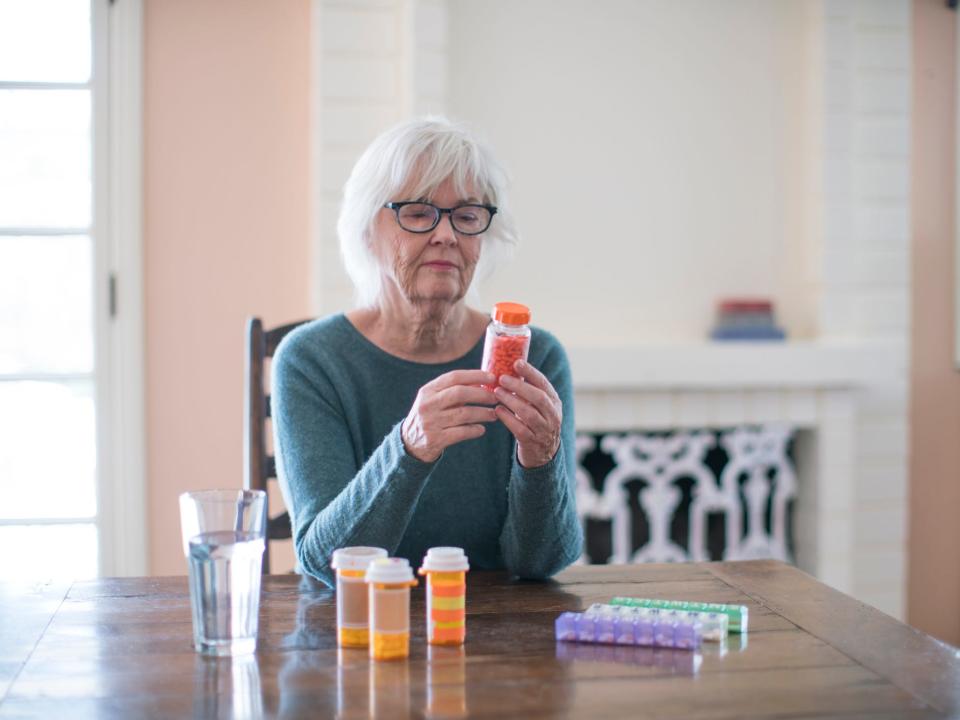6 things we found were linked to cancer in 2020, from weight-loss pills to sitting too much

Cancer is the second-most-common cause of death in the US, after heart disease.
While the reasons any one person gets cancer aren't entirely understood, it seems to be influenced by genetics, the environment, eating habits, family history, and even our jobs.
Scientists linked several things to cancer risk in 2020, including aspirin, hair dye, and weight-loss pills. While correlation does not equal causation, some of the findings are sure to prompt more research.
1. Aspirin use in older adults

Aspirin has previously been recommended to reduce chronic health risks like heart disease and cancer as people age because of its anti-inflammatory properties.
But the National Cancer Institute announced this year that a large new study had linked the over-the-counter painkiller to greater risk of dying from advanced stages of cancer in people over age 70.
Participants in the study who took 100 milligrams of aspirin daily were nearly 20% more likely to receive a diagnosis of advanced cancer, and 30% more likely to die from it, than peers who took a placebo.
Aspirin use in general wasn't linked to greater chances of developing cancer.
Researchers were surprised by the results, since previous studies suggested aspirin had a protective effect against colorectal cancer.
It's now suspected — but not confirmed — that aspirin may have a previously unknown effect on the immune system in older people.
The news might ultimately cause doctors to stop recommending aspirin as a preventive measure while still allowing it in specific cases, though more research is needed.
2. Permanent hair dye may cause hormone disruptions that are linked to cancer

Research late last year found hair dye and straighteners might have a disruptive effect on women's hormones, Insider previously reported.
Specifically, those products were associated with small increases in breast-cancer risk. Most at risk, according to the study, were Black women, who are much more likely than white women to alter their hair with chemical-laden formulas, sometimes including known carcinogens like formaldehyde and coal tar.
More recently, a 2020 study published in The BMJ found permanent hair dyes were linked to breast cancer, ovarian cancer, and basal carcinoma.
Temporary hair dyes were not associated with cancer risk, however, and permanent dyes didn't appear to increase the risk of other types of cancer.
A limitation to this study it that it mainly included white women, all of whom were healthcare professionals, so it's not clear whether the results apply to other demographics.
There's also a lot we still don't know about how the frequency of exposure might make a difference in any health risks of hair dyes, or even what types might be to blame.
The researchers concluded that more research was needed to understand who might be at risk and how concerned we should be.
3. A high number of sexual partners and sexually transmitted infections

A study this year found that having a higher number of sexual partners could, in some cases, be linked to greater risk of cancer.
Specifically, people with 10 or more sexual partners in their lifetime were more likely have developed cancer, researchers found.
That can most likely be explained in part by the fact that more partners can increase your chances of being exposed to a sexually transmitted infection. Certain types of these, such as human papillomavirus, or HPV, are associated with cancers of the genitals or throat.
Women in particular had a higher risk of cancer if they had more partners, most likely because HPV is one of the main causes of cervical cancer.
The study found that the higher risk wasn't limited to these types of cancers, however. People with 10 or more partners had a higher risk of cancer of any kind, suggesting other factors may be at work. Lifestyle factors such as diet, exercise, alcohol, and tobacco use are also related to cancer risk.
Researchers looked only at British people over age 50, however, using data from 1999 to 2001, so it's not clear whether these results can be generalized to a broader population.
4. A specific weight-loss pill

In January, the US Food and Drug Administration warned consumers about the popular weight-loss drug Belviq after a safety trial found it was associated with an increased risk of cancer.
The drug's manufacturer, Eisai, voluntarily recalled the product in February. It noted on the Belviq website, however, that its interpretation of the safety trial was different from the FDA's and that the company believed the product still had more benefits than risk.
The medication, which was approved in 2012, was designed to reduce appetite by targeting a specific area of the brain.
It's not clear whether the drug directly caused cancer, and the FDA said in its initial statement that it would continue to evaluate results of the safety trial and update consumers as needed.
The recall highlighted concerns about weight-loss drugs, which have historically included substances with addiction risks, including amphetamines. Medications have since been more cautiously prescribed to treat obesity — currently, only four drugs are approved by the FDA for that use.
5. Too much sitting

The American Cancer Association already recommends regular exercise to reduce your risk of cancer, but new research this year indicates it's even more important than we thought.
New research in 2020 provides the most compelling evidence to date that even minor changes to your daily routine can make a significant difference for cancer risk.
A study of 8,000 people found that participants who were the least active had the highest risk of getting cancer over five years of follow-up.
Previous studies have found similar results using self-reported data, which can be notoriously unreliable. This latest research was unique in that it used an activity tracker to gauge how sedentary participants were during the study period. As a result, the researchers were more confident in their conclusion that a sedentary lifestyle was linked to cancer risk.
Even a small amount of activity, such as walking, was linked to a slightly lower risk of cancer, the study found. And small amounts of more vigorous activity, as little as 30 minutes a day, were associated with a 30% lower risk of cancer.
The study did not provide information on what kind of cancer a sedentary lifestyle was associated with, however, so more research is needed on that and other possible health risks of inactivity.
6. Racism

Whether by protesting police brutality or recognizing how COVID-19 disproportionately affected communities of color, confronting racism was a major theme in 2020.
But it also appears in more subtle forms. Environmental racism, for instance, refers to the tendency for Black and brown people to be disproportionately affected by pollutants in their air, their water, and even their homes. Exposure to toxic chemicals in daily life is linked to multiple types of cancer, in addition to other health issues.
Perhaps most insidiously, racism is also seen in the US healthcare system. People of color are less likely to have access to quality care and more likely to mistrust the medical industry as a result of past injustices.
While this isn't new information, specific research in 2020 produced hard data examining these consequences of medical racism. The end finding is that Black Americans are more likely to die from treatable forms of cancer, as a study from this fall found with colorectal cancer rates. The researchers also found that when Black patients had access to the same treatments as white patients, they had the same chances of surviving.
The researchers said their work showed that improving access to quality care could go a long way toward erasing the racial disparities in the US healthcare system.
Read more:
The biggest diet myths debunked in 2020, from the alkaline diet to 'loaded' fat loss tea
The most dangerous health myths debunked in 2020, from herd immunity to COVID-19 'hygiene theater'
Asbestos, a toxic mineral linked to cancer, was found in eye shadow and a children's makeup kit
Read the original article on Insider

 Yahoo News
Yahoo News 
